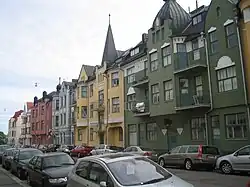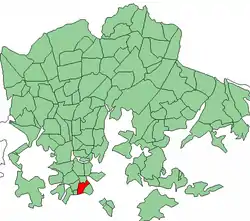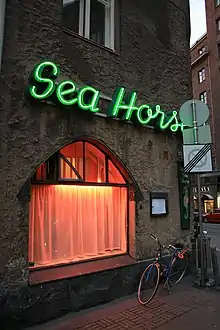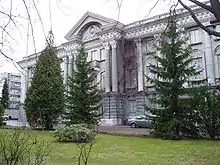Ullanlinna
Ullanlinna (Finnish: [ˈulːɑŋˌlinːɑ]; Swedish: Ulrikasborg) is a city district of Helsinki, in Finland. The name Ullanlinna (English: "Ulla's Castle") refers to the fortification line that was built at the southern edge of the area during the 18th century (no longer visible), as part of the town fortifications, which also included the fortress of Suomenlinna. The name Ulla refers to the Swedish Queen Ulrika Eleonora (1688–1741).[1] During the 19th century the area was dominated by summer pavilions owned by the wealthy Helsinki middle-classes. The appearance of the area changed gradually at the end of the 19th century as the wooden houses were replaced with much higher stone buildings, designed in the prevailing Jugendstil architectural style synonymous with National Romanticism.[2]
Ullanlinna
Ulrikasborg | |
|---|---|
 At the Huvilakatu street in Ullanlinna | |
 Position of Ullanlinna within Helsinki | |
| Country | |
| Region | Uusimaa |
| Sub-region | Greater Helsinki |
| Municipality | Helsinki |
| District | Southern |
| Subdivision regions | none |
| Area | 0.75 km2 (0.29 sq mi) |
| Population (2005) | 10,040 |
| • Density | 13,387/km2 (34,670/sq mi) |
| Postal codes | 00140, 00150 |
| Subdivision number | 07 |
| Neighbouring subdivisions | Eira Punavuori Kaivopuisto |
The central part of Ullanlinna is marked by the Tähtitorninpuisto park (English: Observatory Park),[1] at the centre of which is the former observatory, designed by Carl Ludvig Engel in 1825 in the Neoclassical style of architecture. Other notable buildings in the district are the Design Museum and the Museum of Finnish Architecture.
Gallery
 Tehtaankatu
Tehtaankatu The Viiskulma intersection viewed from Laivurinkatu
The Viiskulma intersection viewed from Laivurinkatu
.jpg.webp) Lähetystalo, the office and church building of the Finnish Evangelical Lutheran Mission at Tähtitorninkatu
Lähetystalo, the office and church building of the Finnish Evangelical Lutheran Mission at Tähtitorninkatu
 Aerial view of Ullanlinna and Kaivopuisto in the 1970s
Aerial view of Ullanlinna and Kaivopuisto in the 1970s
See also
Sources
References
- "Tähtitorninvuoren puiston historiaa". Vihreät Sylit (in Finnish). City of Helsinki. Retrieved October 22, 2021.
- "In Helsinki, Modern Units to Art Nouveau Gems". The New York Times. Retrieved October 22, 2021.
